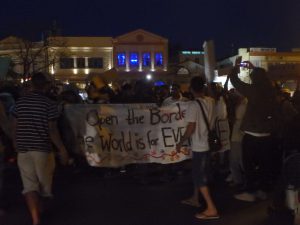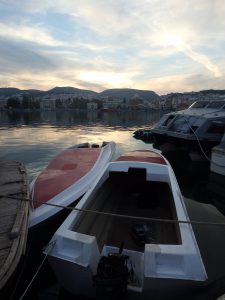Uprisings in Moria on 24th October, EASO-containers burned down once again
Already for weeks, tensions on the Aegean islands run high after the Greek government announced to open three more so-called “hot-spots” only for “pre-removals” on the islands of Lesvos, Chios and Kos. They are, in fact, deportation prisons. Local residents and municipalities oppose these plans. At the same time, the atmosphere within the camps is boiling over. After months of waiting, the entire time threatened to be deported to Turkey, people have repeatedly protested against the imprisonment in inhumane conditions. It has been announced that, from November onward, weekly deportations to Turkey for 200 persons each time will take place, coordinated by Frontex. This would turn Lesvos into a deportation hub.

Last Monday, the 24th of October: Once again a fire destroyed containers where registrations and asylum-interviews were being conducted by EASO, an agency of the European Union. This agency, composed of about 20 officers sent by the different EU member states, coordinates to “facilitate” the registration procedures in the “hot-spot”. The most recent fire damaged 2 and completely burned down 6 of the 12 EASO containers. In reaction, EASO announced to cease their asylum operations for an unspecified period of time, suggesting that their staff’s safety could otherwise not be guaranteed. On the Friday before Monday’s fire, a ferry had been used again to deport people to Turkey. On Saturday, a Pakistani man who had escaped from the closed part of the detention camp got seriously injured when he was beaten up by police. The unconscious man was brought to a hospital but returned into the camp only one day later. This was probably the last straw and people began to revolt. At the same time, migrant uprisings occur continuously and are signs of desperation and suffering in a state of unfreedom. Being denied the freedom to move, these people have to endure in unbearable conditions, always threatened to be deported.
Already a month ago, a large section of the Moria camp had burned down. Regularly revolts and outbursts of tensions take place also on the islands of Chios, Samos, Kos and Leros – at places where people are stuck for months. These islands are being used as prisons, and its inmates are not allowed to leave to continue their journey. More than 15,000 people are now stuck on the Aegean Islands (nearly 6,000 on Lesvos, 4,200 on Chios, 2,000 on Samos, 1,900 on Kos and about 750 on Leros).

The deportations from Friday, the 21st of October were coordinated by the Greek police and Frontex. Frontex has been actively involved in all deportations from the Greek islands, following the EU-Turkey-deal. Initially, they had announced to deport 162 people, but 103 applied for asylum shortly before, so that, in the end, 59 people were deported to Turkey (49 from Iraq, 3 from Afghanistan, 2 from Iran and 5 from Syria). The Syrians were taken as usual by an airplane chartered from Astra Airlines to Adana, after picking up another 13 Syrians from Kos. Another 54 have were picked up from three different prisons on the mainland (15 from Korinthos, 40 from Peloponnese, 2 from Petrou Ralli); only two of them were directly deported from Lesvos, all others were brought by large police vans onto the ferry from Athens to Mytilene and were then pushed in harbour onto one of the ferries that connects Mytilene with Dikili (Turkey). With the announcement to start weekly coordinated deportations from November onward, Lesvos is meant to become a deportation hub for deportations also from the Greek mainland.
Another deportation followed on 27th of October with 41 people being removed to Turkey: 22 of them within the framework of the EU-Turkey deal (13 from Algeria, 4 from Pakistan, 1 from Iraq, 1 from Morocco, 1 from Bangladesh, 1 from Nigeria, 1 from Lebanon, all men). There were 17 negative asylum decisions in second instance, one negative in first instance without appeal and 3 persons resigned from their asylum requests. Another 19 people were deported within the framework of the Greek-Turkish readmission agreement (all of them men from Pakistan, they had not expressed desire for international protection).
Since the EU-Turkey-deal came into effect on the 20th of March, and up until the 27th of October 2016, these are the figures for the deportations that occurred, following different agreements:
– 1158 deportations to Turkey took place under the bilateral agreement between Turkey and Greece.
– 55 people were deported based on the readmission agreement between EU and Turkey.
– 716 deportations were based upon the EU-Turkey-deal.
– Another 716 people “voluntarily” returned to Turkey, facilitated by IOM.
The new announcement of weekly deportations from Lesvos means that there will be transfers of prisoners from the Greek mainland to Lesvos on a daily basis. Lesvos will turn into the main deportation island of Greece. This is happening silently, without any public attention, since local attention is mostly paid to attempts to remove more of the refugees still stuck on the island. At the same time, the Greek coastguard has hindered even tourists who visited the island for a few days, from returning to Athens. Having visited friends or relatives, many people seem to be stuck for days and keep waiting for checks of their papers, while the authorities need days to verify whether their papers are valid. It is a self-inflicted crisis. The negative image of the situation is produced by the authorities and not by the presence of refugees on the island.

For a long time, Lesvos was a place to welcome those newly arriving. This was the case especially last year, when at peak times, 10,000 people arrived daily on the island as part of their journeys to find safety in other European countries. Throughout the world, Lesvos has become known for the openness and hospitality that its inhabitants demonstrated and for their courageous efforts to help those in transit who had stranded on the island. Collectively we should resist EU authorities who try to turn this island into a symbol for Europe’s deterrence policies and stand against these attempts to turn Lesvos into a deportation hub.
